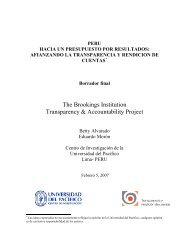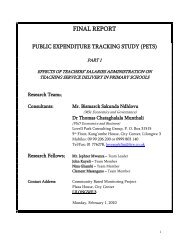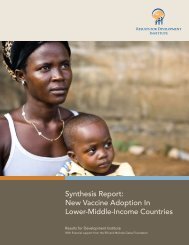Provider Purchasing and Contracting for Health Services_The Case
Provider Purchasing and Contracting for Health Services_The Case
Provider Purchasing and Contracting for Health Services_The Case
You also want an ePaper? Increase the reach of your titles
YUMPU automatically turns print PDFs into web optimized ePapers that Google loves.
ecommended drug, artemether-lumefantrine, is too expensive <strong>for</strong> the private sector. To<br />
ensure that the treatment procedures are aligned in all sectors, the government has undertaken<br />
to provide free or subsidized drugs to the private sector.<br />
Similarly, the government has provided the private sector with anti-retrovirals to scale up<br />
HIV <strong>and</strong> AIDS treatment in Zambia. Although this partnership has existed since 2007, the<br />
Ministry of <strong>Health</strong> started in 2008 the process of accrediting public <strong>and</strong> private health centers<br />
as “centers of excellence,” through the Medical Council of Zambia (the health sector<br />
regulatory authority), to offer anti-retroviral services through the partnership. To qualify as a<br />
“centre of excellence,” a facility must have qualified personnel, laboratory facilities, <strong>and</strong><br />
sufficient <strong>and</strong> patient-friendly consulting space. In all these partnerships, in<strong>for</strong>mation sharing<br />
is regarded as a critical component of these partnerships.<br />
Limitations of the partnership design<br />
During interviews, the private <strong>for</strong>-profit providers observed that although these partnerships<br />
exist, they do not cater to the needs of the poor.<br />
First, the drugs are supplied only when the government has some stock. This implies that<br />
clients may not be able to access af<strong>for</strong>dable services with persistent stock-outs. <strong>The</strong><br />
unpredictability of supplies makes it difficult <strong>for</strong> the private sector to provide sustainable<br />
services through these partnerships. <strong>The</strong> representative of the private health practitioners of<br />
Zambia stated that the design of the partnerships does not take into account the true cost of<br />
treatment. For instance, while drugs are given <strong>for</strong> free, the representative explained, the<br />
consultancy fees in the private sector are quite high <strong>for</strong> the poor Zambian. This acts as a<br />
barrier to accessing private sector care.<br />
Second, the partnerships do not provide <strong>for</strong> the reimbursement of implicit <strong>and</strong> hidden costs<br />
arising from diagnostic <strong>and</strong> laboratory services that the private practitioners incur when<br />
treating patients. Considering the high cost of these services, an average patient cannot af<strong>for</strong>d<br />
to seek care from the private <strong>for</strong>-profit providers. With this limitation, the private sector ends<br />
up subsidizing the government <strong>and</strong> the poor clients, which is a disincentive to entering into<br />
these partnerships.<br />
Although partnerships are emphasized in government policy documents, the private <strong>for</strong>-profit<br />
sector feels that very little or nothing is being done to translate them into tangible action. One<br />
of the managers observed that although the Medical Council of Zambia is authorized to<br />
register, monitor, <strong>and</strong> supervise the private practitioners, it does not have a clear accreditation<br />
criterion as obtaining in government facilities which are classified based on the type of<br />
services they are able to offer. Rather, the council is faced with unwarranted government<br />
intervention resulting in the influx <strong>and</strong> registration of unqualified medical personnel<br />
especially from the Far East. <strong>The</strong> lack of criteria <strong>and</strong> en<strong>for</strong>cement of st<strong>and</strong>ards make it<br />
difficult to enter into contracting with the government. It was also noted that in<strong>for</strong>mation is<br />
lacking on the services that the private sector offers because the Medical Council of Zambia<br />
has no capacity to supervise <strong>and</strong> monitor services.<br />
As one per<strong>for</strong>mance indicator, the private sector is supposed to provide the government with<br />
in<strong>for</strong>mation about the patients <strong>and</strong> usage of the drugs. However, the government does not<br />
collect this in<strong>for</strong>mation, <strong>and</strong> if it is provided, the Ministry of <strong>Health</strong> does not take that<br />
in<strong>for</strong>mation in account. One of the managers stated, “My facility compiles the relevant drugs<br />
55
















